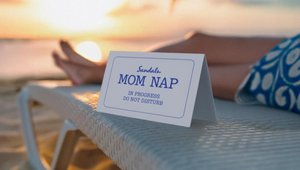
Behind a Duo of Action-Packed Spots That Sneakily Test Viewers’ Eyesight

According to a study conducted by VSP Vision Care and YouGov, nearly 97% of people agree that having healthy eyes is important. Then, why do only 50% of us make the effort to get annual eye exams?
To combat this, US eyewear and eyecare provider Visionworks launched a campaign of almighty sneakiness that tested viewers' eyesight without them knowing it. (If you haven’t seen the campaign before, we recommend casting your eyes a little further down the screen to the end of this introduction to check out one of the spots, so as not to ruin the surprise!)
‘Subtitles’, which was created by Leo Burnett Chicago, is presented as foreign-language films that require subtitles to follow along. Throughout the spots, the font size of said subtitles becomes progressively smaller before revealing that each viewer has been taking - and potentially failing - a test of their vision the entire time.
Using consumer data related to average screen size and distance we sit from screens, Visionworks identified the most appropriate font sizes for the subtitles to create this mock vision test, while highlighting the discrepancy between what the viewer ultimately sees and what they would potentially see with 20/20 vision.
According to Britt Nolan, president and chief creative officer at Leo Burnett Chicago, the campaign was loosely inspired by an insight that people are fine with less-than-perfect eyesight because they don’t know what they’re missing.
But, in truth, there was far more to it than that. It was the kind of idea that had a packed meeting room of people excitedly talking over each other. LBB’s Addison Capper chatted with Britt to find out more.
LBB> Subtitles is such a brilliant idea - from where did that first initial nugget of inspiration come from?
Britt> Have you ever watched an episode of Narcos in bed? That’s basically where the idea came from.
Actually, the very first iteration of this idea was not subtitles at all, but a story driven entirely by supers that got progressively smaller. Which could have been awesome with the right writing. But the team shared it in a big meeting, and when someone suggested it might be better as subtitles on a foreign film, the room became absolutely electric. Everybody started brainstorming and tossing out ideas and talking over each other and laughing. When that happens, you gotta go with it.
LBB> What was the brief from Visionworks and what was the path that led to these spots?
Britt> As with most of our brands, we try to keep a simple ‘always-on’ brief, where our clients have a problem they’d always welcome a creative solution to. That way we aren’t just reacting to their asks, but we’re able to be more proactive.
For Visionworks, specifically, it's based on its mission to simplify eye care. We know that nearly 85% of people say vision is their most important sense, but only 50% actually get their eyes checked each year. How can we make it simpler?
We also had this insight floating around that people are happy to put up with less than perfect vision because they don’t realise what they’re missing. We just weren’t quite sure what to do with it.
When we had the idea, we didn’t bring the client a script. The team created a rough cut with found footage from an old samurai movie, just to see if it worked. That approach wouldn’t make sense for most ideas, but this time it was brilliant. You couldn’t watch the cut without falling in love.
LBB> The key idea is quite detached from the narrative and style of the ads - you had to make action and horror movies! What was that challenge like? How did you lean into the particular styles that you'd chosen?
Britt> The goal was to make these films impossible to enjoy if you couldn’t follow the dialogue. That was really what drove our executional decisions. The original test edit with the samurai movie was good, but a sword fight is interesting to watch whether you catch what they’re talking about or not.
That part of the process was really helpful because it made us realise that we had to find the perfect balance between being visually captivating while ensuring the images didn’t tell the whole story. And of course, we had to create dialogue that you’d get swept up in so that you’re willing to overlook the fact that the type is becoming so painfully small.
We didn’t care so much about genre as just making them feel like they could be real movies. They were shot with anamorphic lenses, so even the aspect ratio would feel different from whatever they were just watching.
‘Bomb Test’ was crafted to feel familiar, even dated. It’s a scenario we’ve seen a million times and there’s a vintage vibe to the art direction and lensing, which is all designed to make their conversation feel even more absurd.
With ‘Bed Test’ the goal was to make every frame feel as unsettling as possible. The visual contrasts (a bio-suited official vs a barefoot woman, a mundane room vs unseen horror), the dripping slime, and an under-bed camera position on an unkempt floor all worked together to create a situation where the viewer is off-balance but glued to the screen.
LBB> What was the research process like around German action and Japanese horror movies?
Britt> It was a lot like emailing each other clips of obscure foreign movies!
The whole thing was actually a little tricky because if you go over the top with it, it starts to feel like a spoof, and you can get into a weird place of poking fun at cultural stereotypes.
We decided to go with Japanese and German simply because they’re languages that aren’t commonly spoken in the US. Because obviously, if you understand the dialogue, you’re less likely to rush out to Visionworks for an eye exam.
LBB> How did you find the challenge of writing in a way that would translate suitably to those languages?
Britt> It had more to do with length than anything. We wanted the subtitles to be a certain length on screen, but you can write a sentence in English which, when translated to Japanese, becomes much shorter or much longer. So, it was a bit of a puzzle.
We shot with two interpreters on set. That was a lifesaver because there’s always ad-libbing and changes that come up on the fly. Like, for example, when the spoken dialogue turns out to be twice as long as what you wrote in English, and you have to cut it all in half – because that’s what happened. You almost always go into a shoot expecting to tweak and play around with dialogue on the day, but with this particular idea, it was a lot more complex than you might imagine.
LBB> How did you work out the size and style that the subtitles needed to appear in?
Britt> Subtitles vary in size for different screens, such as TV, mobile and cinema, so we created different versions for each. Getting it right meant taking into account the average size of the screen and viewing distances to create accurate subtitles that could function as a vision test. We left that part to the account team and producers, as employing mathematical concepts such as addition, multiplication and even division would have been a lot for the creatives.
LBB> Why was Steve Miller the perfect director to bring these spots to life?
Britt> Steve has the perfect blend of talents for this project. He’s done so much great comedy, but his attention to detail gives him so much range. Just look at the work he did with ‘The Most Interesting Man in The World’ for Dos Equis. Each one of those spots is like five different period pieces and he did like a thousand of them.
He was also just an awesome partner. Since this was a proactive project, we needed to present the client with a complete production solution. Steve was our dream director for this project, so we were thrilled when he was willing to get in early and partner with us to craft the work before we even shared it with the client.
LBB> What was the production process like?
Britt> It’s always great when we can get a director and production company engaged early enough to really shape the idea. Steve didn’t just shoot the board; he played a big role in identifying genres and refining the scripts.
We shot both spots on location at Riverview Hospital, an abandoned mental institution in Vancouver. People believe it to be haunted – multiple crew members told us stories of past productions where they heard random screams and door slams while filming, which is exciting.
We shot both spots in one day, which was probably helped by the fact that we were filming performances in languages neither the agency nor the client spoke or understood – “Sounds perfect! They nailed it! Let’s move on!”
In all seriousness, we were very lucky to find exceptional actors.
LBB> What kind of reaction did you see from viewers of the spots?
Britt> It’s a noise people make when the ‘THIS IS A TEST’ super appears. I realise I’m probably taking this question too literally, but I’m serious. It’s fun to watch people watching this work.
If you see it in cinema, you’ll notice the theatre gets really quiet while the film is playing and the instant it turns the corner to the payoff, there’s a palpable release that you can actually hear.
I can’t discuss business results just yet, but haven’t you noticed there seem to be a lot more people wearing glasses out there?
LBB> I saw a quote from you that these ads made you smile - what are your general thoughts on the state of comedy in advertising in 2023?
Britt> My point of view is really simple: I think people would appreciate it if we all made more genuinely funny advertising.
I don’t have any data to support this. I’ve just noticed that people like to laugh. And they don’t seem to like advertising very much. So, if your advertising could make them laugh, I’m thinking that might be a pretty good way to get them to like your advertising.
It feels like the award shows are honouring more comedy this year than they have in years past, which I think is a good thing. Humour doesn’t usually perform so well in the award shows, but it should. I think it’s really important that we encourage more funny work.















